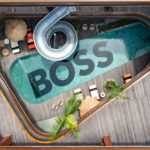These days it’s nearly impossible to scroll through Instagram and not see devastating photos depicting an array of plastic waste washing up on the beaches of Indonesia. But there are small, practical changes you can make that will effect big changes, and we got Manuela Baron, a.k.a. The Girl Gone Green, to tell us how.
This plant-powered Insta-activist is one of our hands-down favourite low-waste warriors, and we thought it was about time we had a chat. Read on to be inspired.
Read also: Everything you should know about eco-sustainable tourism
What was your life like before transitioning to a Zero Waste lifestyle?
I was the opposite of a tree hugger. I used to beg my mom to buy plastic water bottles so I could fit in with my friends, and collecting makeup and fashion was my pastime. I’ve come a long way.
What inspired you to begin living more sustainably?
When travelling, I realised the one thing that every country had in common was trash. No matter where I was, I’d find plastic goods littered on the street. And to see some of the world’s most beautiful places destroyed by our need for consumption – it stuck with me.
“When travelling, I realised the one thing that every country had in common was trash.”
What has been the most rewarding aspect of living with less waste?
Sharing it with others, but you don’t notice the impact you have until much later. The other day, a bank teller recognised me from college. She was ecstatic to share her eco-friendly changes with me. At her desk, she had a reusable water bottle, a mug with soup and metal utensils. You never know who will resonate with what you have to say, and it’s stories like these (two years later) that make it all worthwhile.
Has this journey influenced your life in any unsuspected ways?
It’s created a lot of self-reflection. I find myself overanalysing all my decisions. How will driving to this coffee shop impact the Earth, or what I order. It can be a blessing and a curse. Sometimes you just want to live a normal life and not worry about the devastating consequences of your mindless actions.
Read also: Zero Waste: where to shop
Why do you think it’s important for people to live with Zero Waste in mind?
I think most people want to leave the Earth a better place, and Zero Waste offers them an actionable way to make a difference. Politics and business can be hard to control, but Zero Waste is about individual action.
What advice do you have for people who want to start creating less waste?
Take it slow. Take it one step at a time. Just know you don’t have to be completely Zero Waste. It’s all about moving towards a circular economy. It’s better for you to learn how your actions have an impact, rather than obsessing over trash. Focus on living consciously, and you will reduce your trash.
“The idea that you have to go out and buy and replace all your items with glass, or with something else, is ridiculous and unsustainable.”
What’s the most common misconception you’ve faced?
That it’s expensive. Zero Waste is not expensive unless you want it to be. A lot of the Zero Waste products and ‘essentials’ people add on their blogs aren’t essentials. Most of the time you have these things in your home already. For example, you don’t need a wooden toilet bowl cleaner because you most likely already have a plastic one – so why are you buying a new one? The idea that you have to go out and buy and replace all your items with glass, or with something else, is ridiculous and unsustainable. Zero Waste has saved me a ton of money. I simply buy less stuff and waste less food and resources.
What are a few common challenges you face when travelling?
Finding water that is clean AND plastic free. The sad reality is water sources all over the world are being polluted – and often by the companies that bottle water. In countries like Fiji, the clean water is being used for foreign exports, leaving very little for its own people. Clean water is a fundamental right, and unfortunately it’s hard to come by when travelling abroad.
Where has been your favourite place to visit when travelling low impact?
I think Bali is moving towards being eco-friendly. There are great plant-based restaurants and more and more eco-minded accommodations. I really appreciated the bamboo straws used in Ubud, and the composting system they have adopted; it’s an island that values nature. The Balinese believe that everything has a soul and therefore must be treated with respect. I’m happy these practices are trickling into the tourism industry.
What’s your advice to someone interested in travelling with lower impact?
BYOB – bring your own bottle – because having a to-go set really helps. I eat a lot of street food, so having a metal container really helped me avoid Styrofoam at food stalls, and I can get my mango sticky rice without all the trash. A [reusable] water bottle can be filled up at restaurants and hotels, and after a long day of sightseeing, you’ll be happy you filled up your bottle.
Overall, be mindful of your actions. Are you leaving this place better than you found it? Don’t be afraid to pick up trash at the beach, or use your own bamboo utensils at restaurants. And try your best by making the most conscious decision. If your only option is a plastic water bottle, choose the largest size the store sells – because small choices have a big impact.
Read also: The conscious traveller’s guide to Bali





